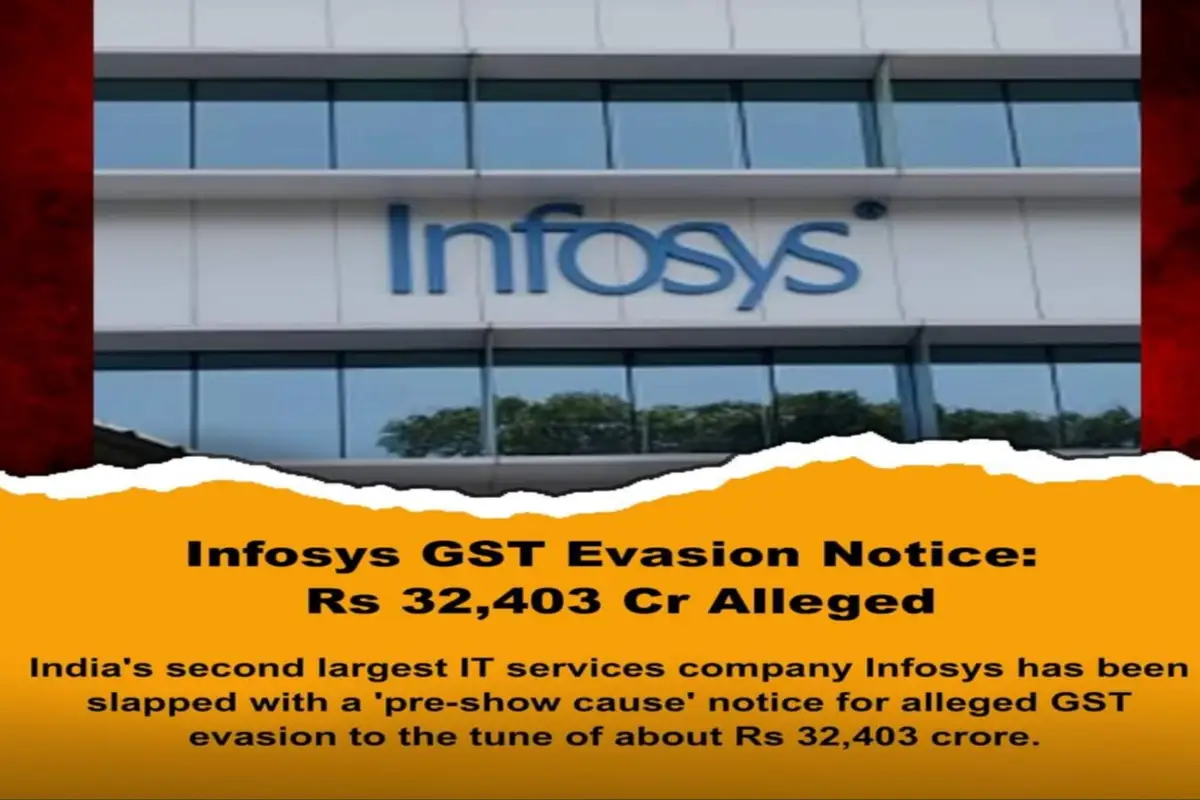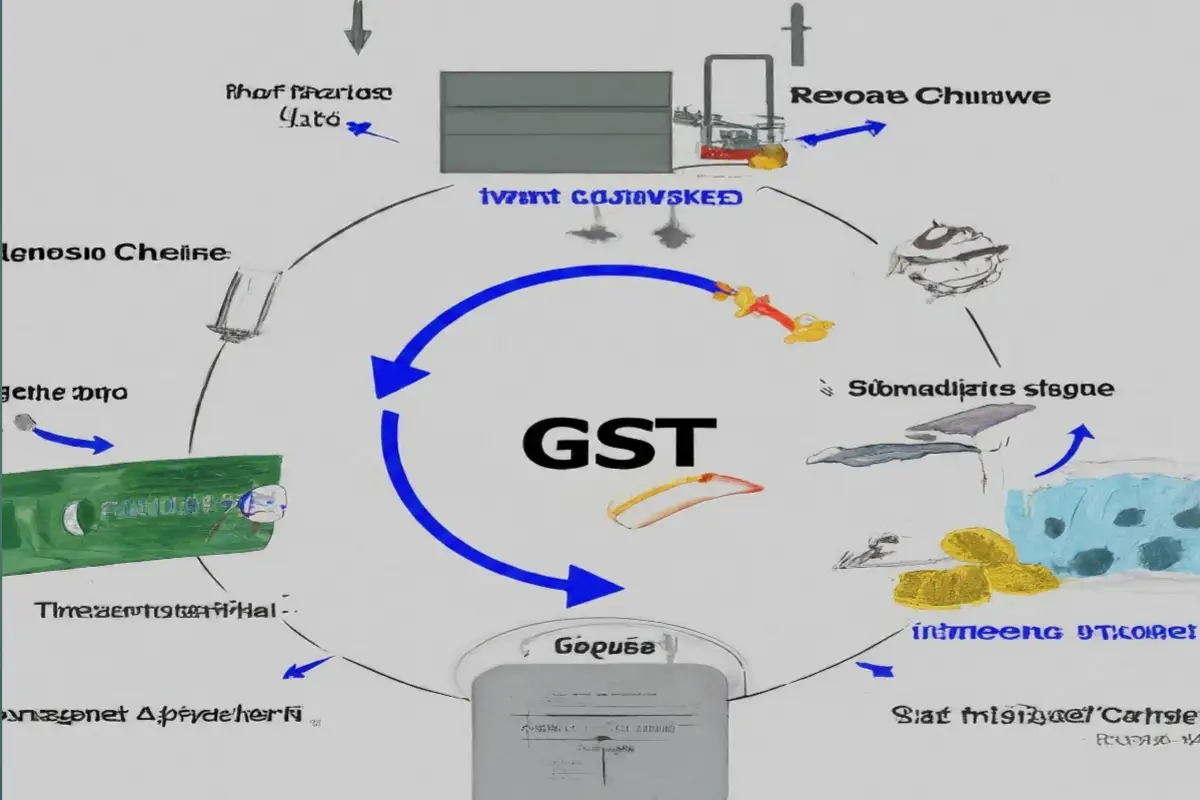Overview
Infosys, one of India’s leading IT companies, has been issued GST notices alleging tax evasion totaling Rs 32,000 crore. The announcement led to a 3% drop in the company’s American Depositary Receipts (ADRs). This article delves into the details of the case, its implications, and the potential impact on the company and the broader IT sector.

Background on Infosys
- Founded: 1981
- Headquarters: Bengaluru, India
- Revenue (FY 2023): $18.7 billion
- Employees: 343,000+
- Market Cap (July 2024): $83 billion
Infosys is renowned for its services in IT consulting, software development, and business process management. It has consistently been recognized for its strong corporate governance and has a substantial presence both in India and globally.
The Allegation
IT behemoth Infosys is embroiled in a significant tax dispute with the Indian government. The Directorate General of GST Intelligence (DG GSTI) has slapped a whopping Rs 32,000 crore GST demand on the company for alleged tax evasion between July 2017 and March 2022.
The Core Issue: Reverse Charge Mechanism
The crux of the matter lies in the interpretation of the Reverse Charge Mechanism (RCM) under GST. The tax authorities contend that Infosys should have paid Integrated Goods and Service Tax (IGST) on services procured from its overseas branches. This is because under RCM, the recipient of a service is liable to pay GST if the supplier is unregistered or outside India.
Infosys, however, is contesting this claim, citing a recent Central Board of Indirect Taxes and Customs (CBIC) circular that exempts such services from GST.

The Potential Impact
If the GST authorities prevail, it could have far-reaching consequences for the IT industry. Other multinational companies with significant offshore operations might face similar demands. Moreover, it could lead to a significant increase in India’s GST revenue.
Potential Impact:
- Infosys: Significant financial burden, reputational damage, and potential legal battles.
- IT Industry: Increased compliance burden, uncertainty, and potential for similar tax demands on other MNCs.
- Government: Substantial increase in GST revenue if the demand is upheld.
Key Figures
- Alleged Tax Evasion: Rs 32,000 crore
- Period Under Scrutiny: July 2017 to March 2022
Understanding the Reverse Charge Mechanism
The Reverse Charge Mechanism is a GST provision where the recipient of a supply, instead of the supplier, is liable to pay GST. It is primarily implemented to bring into the tax net supplies from unregistered suppliers or from outside the country.

Details of the GST Notice
The GST notices allege that Infosys failed to pay the required taxes on certain transactions, leading to an alleged tax evasion of Rs 32,000 crore. The investigation covers multiple financial years and focuses on discrepancies in reported revenues and tax filings. Below is a breakdown of the alleged tax evasion:
| Year | Alleged Evasion (Rs Cr) |
|---|---|
| 2018-2019 | 8,500 |
| 2019-2020 | 7,800 |
| 2020-2021 | 6,700 |
| 2021-2022 | 5,500 |
| 2022-2023 | 3,500 |
| Total | 32,000 |
Understanding GST in India
The Goods and Services Tax (GST) is a unified tax system that replaced various indirect taxes in India. Introduced in July 2017, GST is designed to streamline tax compliance and improve transparency. It is categorized into:
- CGST: Central GST
- SGST: State GST
- IGST: Integrated GST
Infosys’ Response
Infosys has issued an official statement denying any wrongdoing and affirming its compliance with all legal and regulatory requirements. The company is cooperating with the authorities and believes it can resolve the matter. Key points from Infosys’ response include:
- Denial of allegations: Asserts no deliberate evasion.
- Commitment to compliance: Emphasizes adherence to laws.
- Cooperation with authorities: Pledges full cooperation.
Impact on Infosys ADR
The announcement of the GST notices led to a significant reaction in the stock market:
- Infosys ADR Decline: 3%
- Previous ADR Value: $18.50
- Post-Notice ADR Value: $17.95
This drop reflects concerns over potential legal liabilities and the impact on Infosys’ financials and reputation.
Market and Investor Reactions
The market response was immediate, with a noticeable drop in Infosys’ share prices. Investors are concerned about:
- Potential financial liabilities: The possible penalties and fines.
- Reputational impact: Damage to the company’s image.
- Future earnings outlook: Impact on financial performance.
Legal and Regulatory Implications
If found guilty of the alleged tax evasion, Infosys could face:
- Fines and Penalties: Significant monetary fines.
- Reputation Damage: Loss of trust among clients and investors.
- Operational Impact: Potential disruptions to business activities.
Media and Public Reaction
The case has garnered extensive media coverage, with different perspectives on the potential impact. Public sentiment is divided, with debates centering on corporate governance and ethical standards in large corporations.
Infosys’ Role in the IT Sector
Infosys is a key player in India’s IT industry, contributing significantly to the economy. The company is involved in numerous high-profile projects and partnerships. The ongoing investigation could:
- Affect contracts: Potential loss or renegotiation of deals.
- Impact partnerships: Strain on existing partnerships.
- Influence industry perceptions: Raise concerns over compliance standards in the sector.
Broader Impact on the IT Industry
The allegations against Infosys could lead to:
- Increased scrutiny: Other IT companies might face similar investigations.
- Cautious market behavior: Investors may become wary of the sector.
- Policy changes: Possible tightening of regulatory frameworks.
Corporate Ethics and Compliance
Infosys has a comprehensive code of conduct that emphasizes ethical behavior and compliance with laws. The current situation serves as a reminder of the importance of these principles and the consequences of potential lapses.
Crisis Management and Lessons Learned
Effective crisis management is crucial in situations like this. Key strategies include:
- Transparent communication: Keeping stakeholders informed.
- Proactive measures: Taking steps to address issues promptly.
- Legal preparedness: Being ready for potential legal challenges.

Next Steps
Both Infosys and the GST authorities are likely to engage in protracted legal battles. The outcome of this case will set a precedent for similar disputes involving multinational companies.
Conclusion
The GST notices against Infosys present a complex challenge with potential legal, financial, and reputational consequences. As the situation develops, Infosys’ actions and the outcome of the investigation will be closely watched. The case underscores the critical importance of compliance with tax laws and maintaining strong corporate governance.
Sources
FAQs
What is GST, and why is it significant?
GST is a comprehensive tax system in India, unifying various indirect taxes into one. It simplifies tax compliance and promotes transparency.
How does a GST notice affect a company?
A GST notice can lead to legal scrutiny, financial penalties, and potential damage to a company’s reputation, affecting its market value and stakeholder trust.
What are ADRs, and why do they matter?
ADRs represent shares of foreign companies traded on U.S. stock exchanges. They are crucial for international investors and reflect the company’s performance and investor confidence.
How can companies ensure compliance with tax laws?
Companies can maintain compliance by accurately reporting transactions, regularly reviewing tax practices, and adhering to ethical standards. Consulting with tax experts is also recommended.
What should investors do in such situations?
Investors should stay informed about the situation, assess the potential impact on the company, and consider diversifying their portfolios. Consulting with financial advisors can help in making informed decisions.